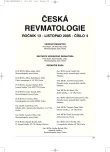RS3PE syndrom (Remitting seronegative symmetrical synovitis with pitting edema)
Authors:
L. Goerojová
Authors‘ workplace:
Revmatologický ústav, Praha
Published in:
Čes. Revmatol., 13, 2005, No. 4, p. 156-163.
Category:
Overview Reports
Overview
Remitting seronegative symmetrical synovitis with pitting edema is a rare syndrom of undetermined etiology up to this time. It affects predominantly elderly Caucasians males. This syndrom was described in 1985 by McCarty et al. and it is clinically characterised with an acute commence of symptoms, with no erosive lesions, with seronegativity and an excellent prognosis. The synovitis in majority of cases went into remission after therapy of low doses of corticosteroids or hydroxychloroquine and remained in remission even after all antirheumatic therapy was stopped. These features make RS3PE syndrom possible to distinguish it from rheumatoid arthritis and polymyalgia rheumatica. The occurrence of RS3PE syndrome in association with malign disorders has a big clinical importance.
Key words:
remitting seronegative symmetrical synovitis with pitting edema, corticosteroids, association with malign disorders
Labels
Dermatology & STDs Paediatric rheumatology RheumatologyArticle was published in
Czech Rheumatology

2005 Issue 4
Most read in this issue
- Antibodies against citrullinated proteins in rheumatoid arthritis
- Experience with leflunomide (ARAVA) treatment of active rheumatoid arthritis at clinical practice in the Czech Republic
- Viral arthritides
- RS3PE syndrom (Remitting seronegative symmetrical synovitis with pitting edema)
